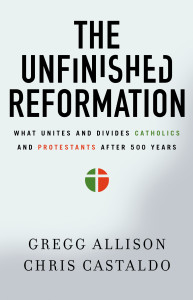Today is when the Roman Catholic Church commemorates the Assumption of Mary into heaven (August 15). While many of the estimated 1.2 billion Catholics in the world will proceed through the day unaware of this fact, it is nevertheless a “holy day of obligation,” [1] a feast day requiring Catholics to attend Mass in observance of the occasion. There is, however, an additional reason why Protestants should be aware of it. The Assumption of Mary offers an illustration of how Catholic traditions (those of a devotional nature) become Sacred Tradition, that is, the authoritative Word of God along with Scripture (CCC, §97).
How Tradition is Embraced As God’s Word
The Assumption of Mary is a dogma of the Church that asserts Mary’s body and soul were assumed into heaven. It is a relatively recent dogma, established on November 1, 1950 by Pope Pius XII. The formal process started in 1946 when Pius sent a letter to the bishops of the world, inviting their opinion on whether the Assumption should be made a dogma of the Roman Catholic faith. He asked two questions: “Do you, venerable brethren, in your outstanding wisdom and prudence, judge that the bodily Assumption of the Blessed Virgin can be proposed and defined as a dogma of faith? Do you, with your clergy and people, desire it?”[2] The pope’s question sent the bishops of the Church to investigate whether Mary’s Assumption could be found in the two sources of Catholic revelation: Scripture and Tradition. Since there is no mention of Mary’s death, burial, or assumption in Scripture, attention quickly turned to Tradition.
An examination of Tradition required bishops to review the faith and practice of popes, other bishops, and laypeople through the centuries. With these groups in view, attention was then focused upon seven areas: dogmatic decrees, Church creeds, Church Fathers, Church Doctors (an honorific title given to a few outstanding teachers since the early church), the teaching of bishops, liturgical practices, and common beliefs and piety of the faithful. After analyzing each of these areas, the bishops responded with the following conclusion. In the pope’s words, “those whom ‘the Holy Spirit has placed as bishops to rule the Church of God’ gave an almost unanimous affirmative response.”[3]
On account of their authority, the bishops found support for Mary’s Assumption in Catholic tradition, and, on this basis, they affirmed its legitimacy. So authoritative was this affirmation that the pope described it as “entirely certain and infallible.”[4] As such, the Assumption of Mary became an essential tenet of Catholic belief, a dogma commanding submission among Catholics everywhere. To disbelieve or contradict the doctrine is to commit a mortal sin, which, strictly speaking, jeopardizes one’s salvation.
Needless to say, the Catholic process of establishing doctrine stands in contrast to the Protestant approach. For Catholics, such development of doctrine is understood as laying hold of the light of the Spirit who infallibly directs the church toward a greater knowledge of salvation history. It also seeks to affirm the role of the laity (the sense of the faithful) in discerning divine truth. From a Protestant point of view, however, the idea of establishing infallible tenets of doctrine on the basis of universal consent is misguided. That is to say, the notion of defining dogma according to church belief or what the church desires is a way to untether oneself from the explicit teaching of Scripture. Such apprehension is central to the evangelical doctrine of “Scripture alone,” which seeks to express what was essentially the concern of Jesus in Matthew 15:9 (cf. Isaiah 19:3), where the Lord warns against presenting the “commandments of men” as God’s word.
 For more on this subject, see our new book, The Unfinished Reformation: What Unites and Divides Catholics and Protestants after 500 Years, in which Gregg Allison and I seek to explain where the lines of agreement and difference fall between Catholics and Protestants.
For more on this subject, see our new book, The Unfinished Reformation: What Unites and Divides Catholics and Protestants after 500 Years, in which Gregg Allison and I seek to explain where the lines of agreement and difference fall between Catholics and Protestants.
FOOTNOTES:
[1] This year it turns out the obligation is remitted because the Assumption feast lands on a Monday.
[2] Apostolic Constitution of Pope Pius XII, Munificentissimus Deus, 11.
[3] Ibid., 12.
[4] Ibid.





